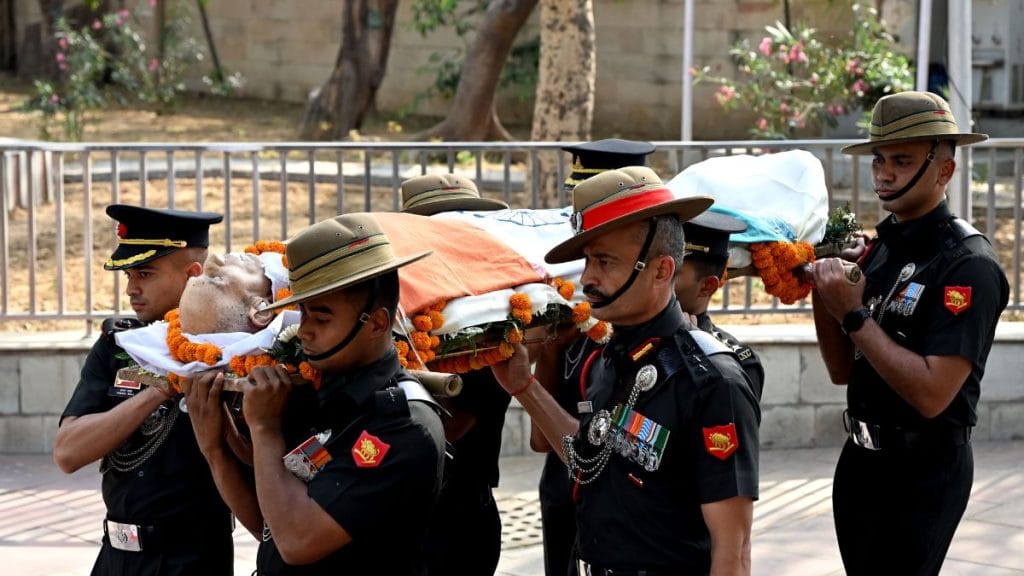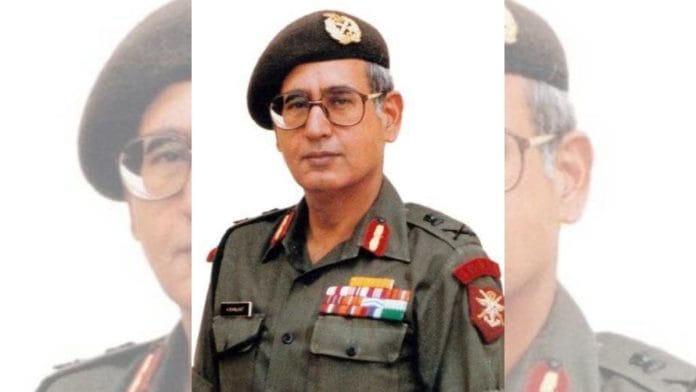An unofficial and unpublished diary recounts Lt Gen AS Kalkat’s exemplary mannerisms in a way none but an eyewitness to the most extraordinary situation could.
The incident in question was sometime in late August 1988: “And the moment GOC IPKF [Indian Peace Keeping Force] walked out of his helicopter and reached the Brigade HQ Operations Room, LTTE [Liberation Tigers of Tamil Eelam] militants opened up with automatic weapons and Rocket Propelled Grenades on the Brigade HQ and the helicopter… And the GOC IPKF, like a fine soldier and displaying true Generalship, stood erect and lit up his pipe, puffing on it in a very deliberate manner. His calmness was distinctive.”
He was a true soldier.
“If you want to go to war, then select Kalkat as Chief of Army Staff,” I overheard my father, Jaswant Singh, telling a senior cabinet minister. This was just a few years after the Jaffna Peninsula incident in Sri Lanka mentioned above. By that time, the soldierly qualities of Lt Gen Amarjeet Singh Kalkat had taken him barely a step away from heading the entire service. He was then General Officer Commanding-in-Chief at the Army’s Southern Command in Pune, and procedurally eligible for Chiefship. I deeply regret never being able to say these words to him.

A cerebral soldier
The Army has lost a veteran with the unusual qualities of cerebral soldiering, impeccable manners, a personal style that is gradually becoming endangered, and above all, a sense of humour. Despite the hard times he witnessed, beginning with combat during the 1965 India-Pakistan war to Operation Pawan in Sri Lanka, Gen Kalkat’s eyes never lost their merriment.
During the 1965 operations, he was hospitalised due to serious injuries. His thick-rimmed glasses and the pipe he smoked became a trademark. Even in discussions about operations and casualties, his eyes sparkled with liveliness.
Commissioned in the 5th Battalion of ‘Shiny Eight’, as 8 Gorkha Rifles is respectfully called within their closed fraternity, Gen Kalkat made a mark in all aspects of soldiering. He led his troops bravely in combat, surviving grievous wounds, and demonstrated an intellectual acumen on par with the academic elite, if not better. As is the wont in a military career, he excelled in courses, which earned him coveted postings in top training establishments like the 58 Regimental Centre, Army War College, Mhow, Staff College in Australia, and as an instructor at DSSC Wellington. It only got better.
Gen Kalkat was the first Brigadier seconded to the emerging Institute for Defence Studies and Analyses (IDSA), a brainchild of the doyen of Indian strategic thinking, K Subrahmanyam. On promotion as Maj Gen, he was even selected for the prestigious fellowship at the London–based International Institute for Strategic Studies (IISS).
In London, he was handpicked to proceed as GOC IPKF, ostensibly to pick charred chestnuts out of a raging fire. He steadied an unwinnable operation into a semblance of order and control, earning deep respect. It’s largely forgotten that he led India’s first, and till now only, tri-service operation.
Also read: IPKF heroes were ignored for 30 years. They are finally getting their due under Modi govt
Lessons learned
The political-military knowledge Gen Kalkat gained at IDSA and IISS is best exemplified by his succinct observations in an interview at the peak of IPKF operations. Asked about the lack of IPKF success, he replied sharply: “In this kind of politico-military task, achievements, can’t be measured in terms of areas conquered or number of enemies killed.”
His words are as relevant as ever for any insurgency–riven area. It stood him in good stead months later when the rabidly anti-Indian President-elect Ranasinghe Premadasa asked for the eviction of the IPKF. The responsibility fell on the Sri Lankan Army Chief to deliver a letter to Gen Kalkat.
Lt Gen Hamilton Wanasinghe, the Sri Lankan Army Chief, was friends with Gen Kalkat and shared his predicament of having to order operations if required.
“I answered that if I were him I would obey the orders of my President. He then asked in that case what I would do. I replied that I would fight to keep my mandate. He thereafter left without delivering the letter from the President,” Gen Kalkat wrote.
Gen Kalkat asked him to do his job. “I’ll fight to keep my mandate,” he said.
Years later, while reminiscing about his career profile to a Sri Lankan newspaper, he wrote: “I learnt two important lessons in 1971. One, you have to prove to the men that you are prepared to face the same danger. You have to be on the frontline. Two, your sense of self-respect should be more than your fear.”
Rest in peace, my General.
Manvendra Singh is a BJP leader, Editor-in-Chief of Defence & Security Alert and Chairman, Soldier Welfare Advisory Committee, Rajasthan. He is writing a book on the IPKF. He tweets @ManvendraJasol. Views are personal.
(Edited by Prasanna Bachchhav)







Fine piece on Gen Kalkat